Brunel University Law of Contract: Consideration Essay
VerifiedAdded on 2022/08/25
|9
|2146
|28
Essay
AI Summary
This essay delves into the Doctrine of Consideration in contract law, critically examining the definition provided by Lush J in Currie v. Misa, which defines consideration as a benefit to one party or a detriment to the other. The essay explores the evolution of this concept, discussing whether the traditional 'benefit and detriment' framework remains the sole determinant of consideration. It references key cases such as Chappell & Co Ltd v Nestle Co Ltd and Stilk v Myrick to illustrate the complexities and potential inconsistencies in applying the doctrine. The analysis further considers criticisms of the doctrine, its historical context, and its relevance in contemporary contract law, particularly in light of the digital age and evolving business practices. The essay argues that while the doctrine has faced scrutiny, it remains a crucial element of contract law, ensuring fairness and mutual benefit in agreements. The essay also includes secondary sources like books, journals, and websites to support the analysis.
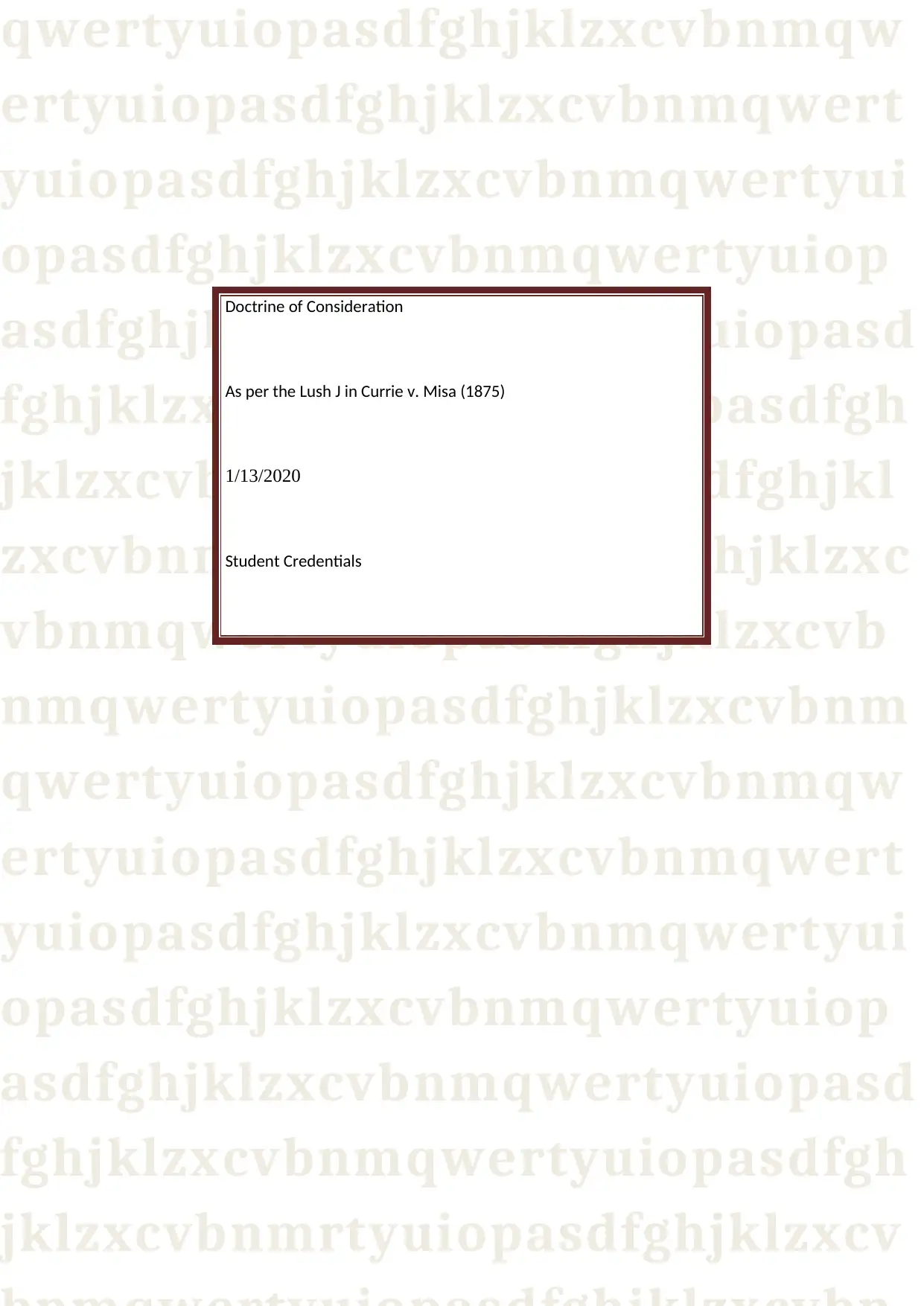
qwertyuiopasdfghjklzxcvbnmqw
ertyuiopasdfghjklzxcvbnmqwert
yuiopasdfghjklzxcvbnmqwertyui
opasdfghjklzxcvbnmqwertyuiop
asdfghjklzxcvbnmqwertyuiopasd
fghjklzxcvbnmqwertyuiopasdfgh
jklzxcvbnmqwertyuiopasdfghjkl
zxcvbnmqwertyuiopasdfghjklzxc
vbnmqwertyuiopasdfghjklzxcvb
nmqwertyuiopasdfghjklzxcvbnm
qwertyuiopasdfghjklzxcvbnmqw
ertyuiopasdfghjklzxcvbnmqwert
yuiopasdfghjklzxcvbnmqwertyui
opasdfghjklzxcvbnmqwertyuiop
asdfghjklzxcvbnmqwertyuiopasd
fghjklzxcvbnmqwertyuiopasdfgh
jklzxcvbnmrtyuiopasdfghjklzxcv
Doctrine of Consideration
As per the Lush J in Currie v. Misa (1875)
1/13/2020
Student Credentials
ertyuiopasdfghjklzxcvbnmqwert
yuiopasdfghjklzxcvbnmqwertyui
opasdfghjklzxcvbnmqwertyuiop
asdfghjklzxcvbnmqwertyuiopasd
fghjklzxcvbnmqwertyuiopasdfgh
jklzxcvbnmqwertyuiopasdfghjkl
zxcvbnmqwertyuiopasdfghjklzxc
vbnmqwertyuiopasdfghjklzxcvb
nmqwertyuiopasdfghjklzxcvbnm
qwertyuiopasdfghjklzxcvbnmqw
ertyuiopasdfghjklzxcvbnmqwert
yuiopasdfghjklzxcvbnmqwertyui
opasdfghjklzxcvbnmqwertyuiop
asdfghjklzxcvbnmqwertyuiopasd
fghjklzxcvbnmqwertyuiopasdfgh
jklzxcvbnmrtyuiopasdfghjklzxcv
Doctrine of Consideration
As per the Lush J in Currie v. Misa (1875)
1/13/2020
Student Credentials
Paraphrase This Document
Need a fresh take? Get an instant paraphrase of this document with our AI Paraphraser
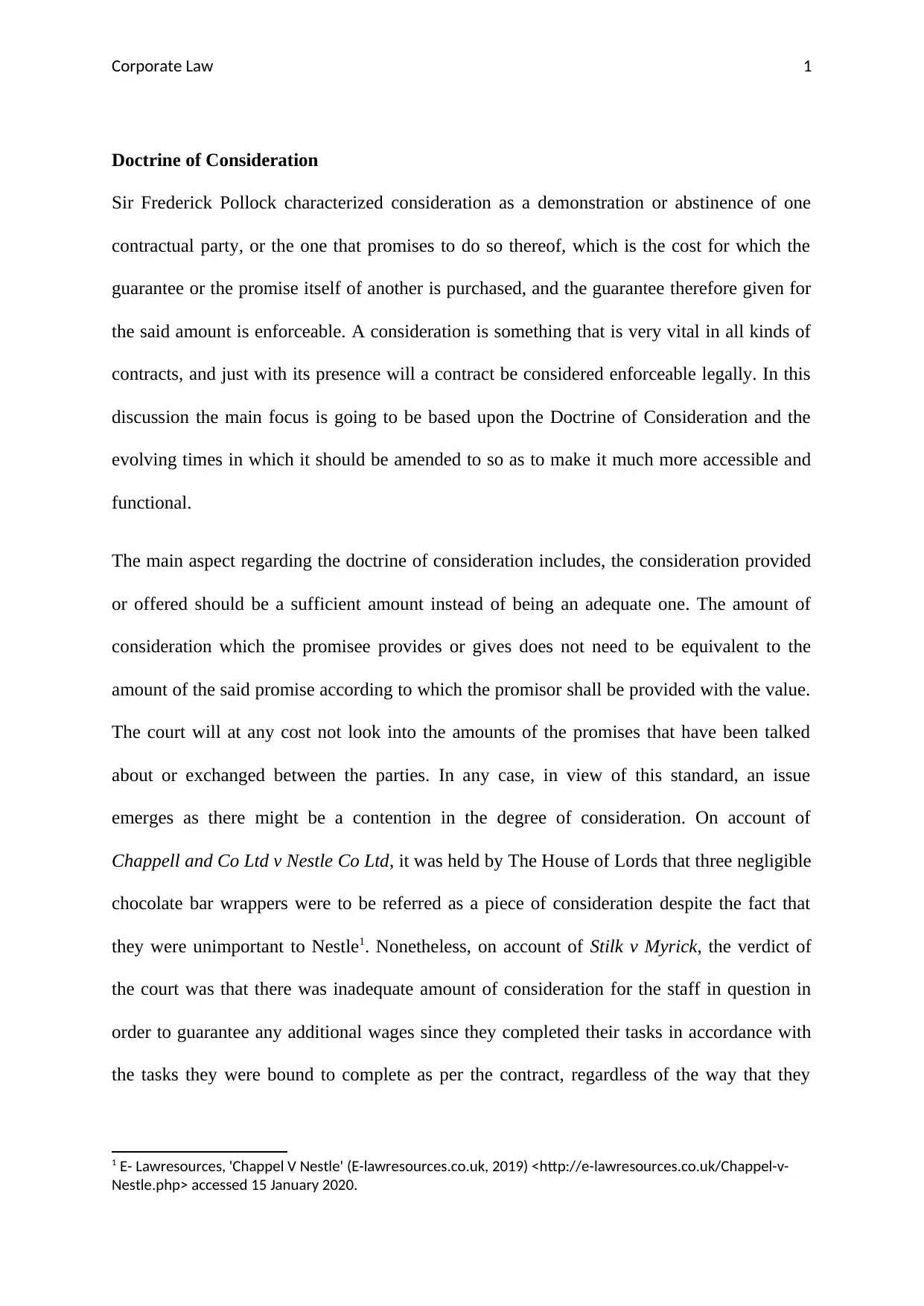
Corporate Law 1
Doctrine of Consideration
Sir Frederick Pollock characterized consideration as a demonstration or abstinence of one
contractual party, or the one that promises to do so thereof, which is the cost for which the
guarantee or the promise itself of another is purchased, and the guarantee therefore given for
the said amount is enforceable. A consideration is something that is very vital in all kinds of
contracts, and just with its presence will a contract be considered enforceable legally. In this
discussion the main focus is going to be based upon the Doctrine of Consideration and the
evolving times in which it should be amended to so as to make it much more accessible and
functional.
The main aspect regarding the doctrine of consideration includes, the consideration provided
or offered should be a sufficient amount instead of being an adequate one. The amount of
consideration which the promisee provides or gives does not need to be equivalent to the
amount of the said promise according to which the promisor shall be provided with the value.
The court will at any cost not look into the amounts of the promises that have been talked
about or exchanged between the parties. In any case, in view of this standard, an issue
emerges as there might be a contention in the degree of consideration. On account of
Chappell and Co Ltd v Nestle Co Ltd, it was held by The House of Lords that three negligible
chocolate bar wrappers were to be referred as a piece of consideration despite the fact that
they were unimportant to Nestle1. Nonetheless, on account of Stilk v Myrick, the verdict of
the court was that there was inadequate amount of consideration for the staff in question in
order to guarantee any additional wages since they completed their tasks in accordance with
the tasks they were bound to complete as per the contract, regardless of the way that they
1 E- Lawresources, 'Chappel V Nestle' (E-lawresources.co.uk, 2019) <http://e-lawresources.co.uk/Chappel-v-
Nestle.php> accessed 15 January 2020.
Doctrine of Consideration
Sir Frederick Pollock characterized consideration as a demonstration or abstinence of one
contractual party, or the one that promises to do so thereof, which is the cost for which the
guarantee or the promise itself of another is purchased, and the guarantee therefore given for
the said amount is enforceable. A consideration is something that is very vital in all kinds of
contracts, and just with its presence will a contract be considered enforceable legally. In this
discussion the main focus is going to be based upon the Doctrine of Consideration and the
evolving times in which it should be amended to so as to make it much more accessible and
functional.
The main aspect regarding the doctrine of consideration includes, the consideration provided
or offered should be a sufficient amount instead of being an adequate one. The amount of
consideration which the promisee provides or gives does not need to be equivalent to the
amount of the said promise according to which the promisor shall be provided with the value.
The court will at any cost not look into the amounts of the promises that have been talked
about or exchanged between the parties. In any case, in view of this standard, an issue
emerges as there might be a contention in the degree of consideration. On account of
Chappell and Co Ltd v Nestle Co Ltd, it was held by The House of Lords that three negligible
chocolate bar wrappers were to be referred as a piece of consideration despite the fact that
they were unimportant to Nestle1. Nonetheless, on account of Stilk v Myrick, the verdict of
the court was that there was inadequate amount of consideration for the staff in question in
order to guarantee any additional wages since they completed their tasks in accordance with
the tasks they were bound to complete as per the contract, regardless of the way that they
1 E- Lawresources, 'Chappel V Nestle' (E-lawresources.co.uk, 2019) <http://e-lawresources.co.uk/Chappel-v-
Nestle.php> accessed 15 January 2020.
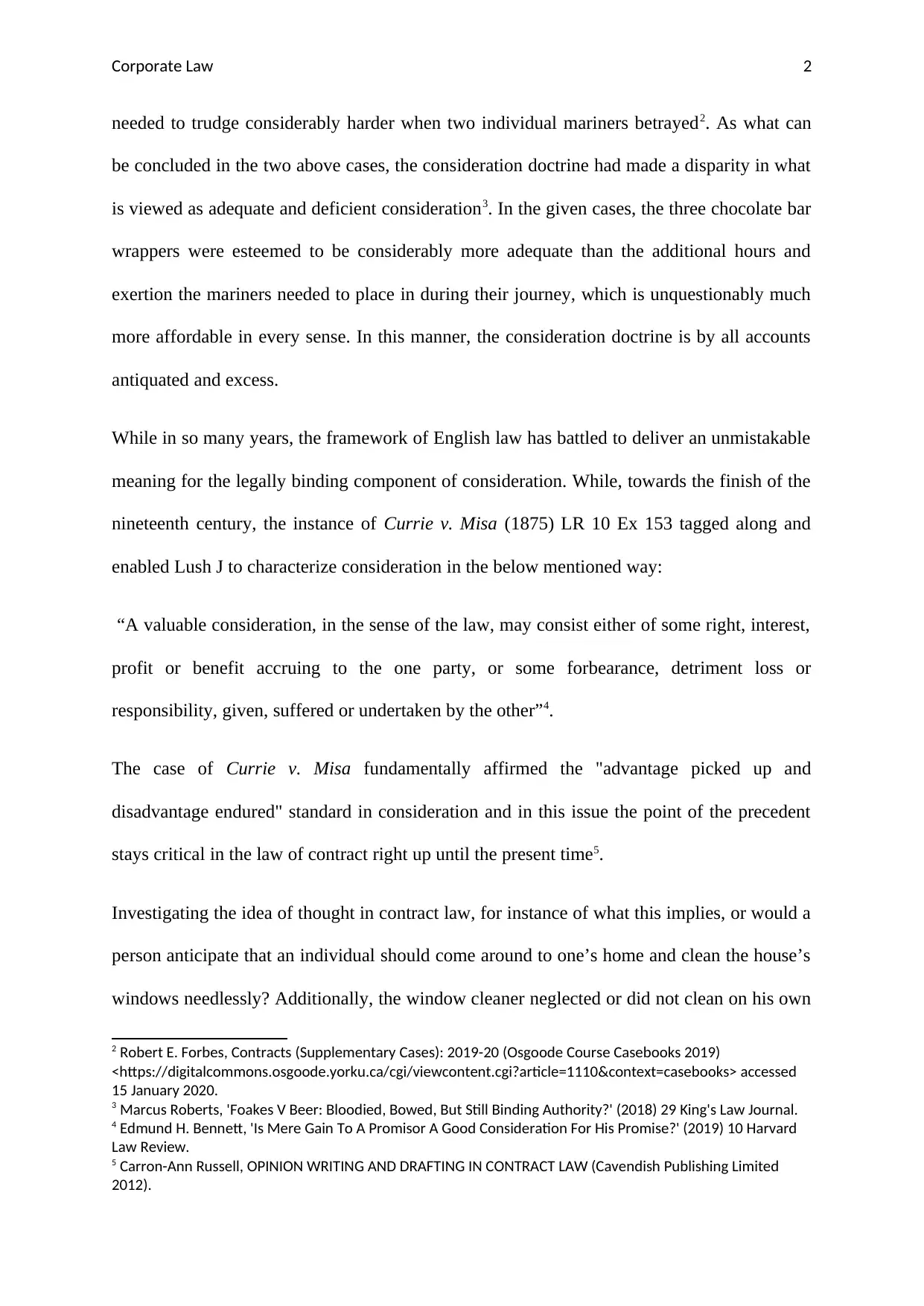
Corporate Law 2
needed to trudge considerably harder when two individual mariners betrayed2. As what can
be concluded in the two above cases, the consideration doctrine had made a disparity in what
is viewed as adequate and deficient consideration3. In the given cases, the three chocolate bar
wrappers were esteemed to be considerably more adequate than the additional hours and
exertion the mariners needed to place in during their journey, which is unquestionably much
more affordable in every sense. In this manner, the consideration doctrine is by all accounts
antiquated and excess.
While in so many years, the framework of English law has battled to deliver an unmistakable
meaning for the legally binding component of consideration. While, towards the finish of the
nineteenth century, the instance of Currie v. Misa (1875) LR 10 Ex 153 tagged along and
enabled Lush J to characterize consideration in the below mentioned way:
“A valuable consideration, in the sense of the law, may consist either of some right, interest,
profit or benefit accruing to the one party, or some forbearance, detriment loss or
responsibility, given, suffered or undertaken by the other”4.
The case of Currie v. Misa fundamentally affirmed the "advantage picked up and
disadvantage endured" standard in consideration and in this issue the point of the precedent
stays critical in the law of contract right up until the present time5.
Investigating the idea of thought in contract law, for instance of what this implies, or would a
person anticipate that an individual should come around to one’s home and clean the house’s
windows needlessly? Additionally, the window cleaner neglected or did not clean on his own
2 Robert E. Forbes, Contracts (Supplementary Cases): 2019-20 (Osgoode Course Casebooks 2019)
<https://digitalcommons.osgoode.yorku.ca/cgi/viewcontent.cgi?article=1110&context=casebooks> accessed
15 January 2020.
3 Marcus Roberts, 'Foakes V Beer: Bloodied, Bowed, But Still Binding Authority?' (2018) 29 King's Law Journal.
4 Edmund H. Bennett, 'Is Mere Gain To A Promisor A Good Consideration For His Promise?' (2019) 10 Harvard
Law Review.
5 Carron-Ann Russell, OPINION WRITING AND DRAFTING IN CONTRACT LAW (Cavendish Publishing Limited
2012).
needed to trudge considerably harder when two individual mariners betrayed2. As what can
be concluded in the two above cases, the consideration doctrine had made a disparity in what
is viewed as adequate and deficient consideration3. In the given cases, the three chocolate bar
wrappers were esteemed to be considerably more adequate than the additional hours and
exertion the mariners needed to place in during their journey, which is unquestionably much
more affordable in every sense. In this manner, the consideration doctrine is by all accounts
antiquated and excess.
While in so many years, the framework of English law has battled to deliver an unmistakable
meaning for the legally binding component of consideration. While, towards the finish of the
nineteenth century, the instance of Currie v. Misa (1875) LR 10 Ex 153 tagged along and
enabled Lush J to characterize consideration in the below mentioned way:
“A valuable consideration, in the sense of the law, may consist either of some right, interest,
profit or benefit accruing to the one party, or some forbearance, detriment loss or
responsibility, given, suffered or undertaken by the other”4.
The case of Currie v. Misa fundamentally affirmed the "advantage picked up and
disadvantage endured" standard in consideration and in this issue the point of the precedent
stays critical in the law of contract right up until the present time5.
Investigating the idea of thought in contract law, for instance of what this implies, or would a
person anticipate that an individual should come around to one’s home and clean the house’s
windows needlessly? Additionally, the window cleaner neglected or did not clean on his own
2 Robert E. Forbes, Contracts (Supplementary Cases): 2019-20 (Osgoode Course Casebooks 2019)
<https://digitalcommons.osgoode.yorku.ca/cgi/viewcontent.cgi?article=1110&context=casebooks> accessed
15 January 2020.
3 Marcus Roberts, 'Foakes V Beer: Bloodied, Bowed, But Still Binding Authority?' (2018) 29 King's Law Journal.
4 Edmund H. Bennett, 'Is Mere Gain To A Promisor A Good Consideration For His Promise?' (2019) 10 Harvard
Law Review.
5 Carron-Ann Russell, OPINION WRITING AND DRAFTING IN CONTRACT LAW (Cavendish Publishing Limited
2012).
⊘ This is a preview!⊘
Do you want full access?
Subscribe today to unlock all pages.

Trusted by 1+ million students worldwide
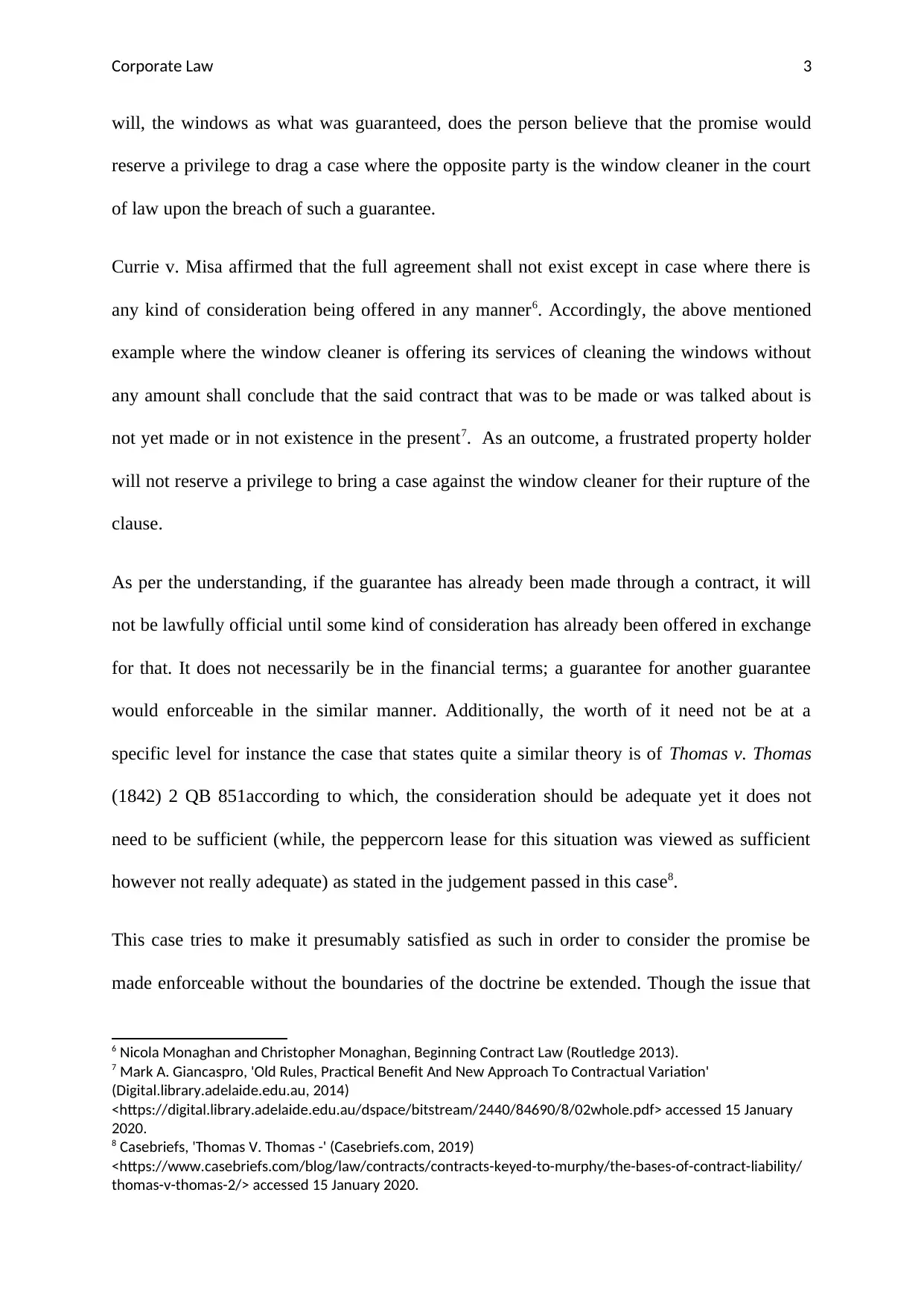
Corporate Law 3
will, the windows as what was guaranteed, does the person believe that the promise would
reserve a privilege to drag a case where the opposite party is the window cleaner in the court
of law upon the breach of such a guarantee.
Currie v. Misa affirmed that the full agreement shall not exist except in case where there is
any kind of consideration being offered in any manner6. Accordingly, the above mentioned
example where the window cleaner is offering its services of cleaning the windows without
any amount shall conclude that the said contract that was to be made or was talked about is
not yet made or in not existence in the present7. As an outcome, a frustrated property holder
will not reserve a privilege to bring a case against the window cleaner for their rupture of the
clause.
As per the understanding, if the guarantee has already been made through a contract, it will
not be lawfully official until some kind of consideration has already been offered in exchange
for that. It does not necessarily be in the financial terms; a guarantee for another guarantee
would enforceable in the similar manner. Additionally, the worth of it need not be at a
specific level for instance the case that states quite a similar theory is of Thomas v. Thomas
(1842) 2 QB 851according to which, the consideration should be adequate yet it does not
need to be sufficient (while, the peppercorn lease for this situation was viewed as sufficient
however not really adequate) as stated in the judgement passed in this case8.
This case tries to make it presumably satisfied as such in order to consider the promise be
made enforceable without the boundaries of the doctrine be extended. Though the issue that
6 Nicola Monaghan and Christopher Monaghan, Beginning Contract Law (Routledge 2013).
7 Mark A. Giancaspro, 'Old Rules, Practical Benefit And New Approach To Contractual Variation'
(Digital.library.adelaide.edu.au, 2014)
<https://digital.library.adelaide.edu.au/dspace/bitstream/2440/84690/8/02whole.pdf> accessed 15 January
2020.
8 Casebriefs, 'Thomas V. Thomas -' (Casebriefs.com, 2019)
<https://www.casebriefs.com/blog/law/contracts/contracts-keyed-to-murphy/the-bases-of-contract-liability/
thomas-v-thomas-2/> accessed 15 January 2020.
will, the windows as what was guaranteed, does the person believe that the promise would
reserve a privilege to drag a case where the opposite party is the window cleaner in the court
of law upon the breach of such a guarantee.
Currie v. Misa affirmed that the full agreement shall not exist except in case where there is
any kind of consideration being offered in any manner6. Accordingly, the above mentioned
example where the window cleaner is offering its services of cleaning the windows without
any amount shall conclude that the said contract that was to be made or was talked about is
not yet made or in not existence in the present7. As an outcome, a frustrated property holder
will not reserve a privilege to bring a case against the window cleaner for their rupture of the
clause.
As per the understanding, if the guarantee has already been made through a contract, it will
not be lawfully official until some kind of consideration has already been offered in exchange
for that. It does not necessarily be in the financial terms; a guarantee for another guarantee
would enforceable in the similar manner. Additionally, the worth of it need not be at a
specific level for instance the case that states quite a similar theory is of Thomas v. Thomas
(1842) 2 QB 851according to which, the consideration should be adequate yet it does not
need to be sufficient (while, the peppercorn lease for this situation was viewed as sufficient
however not really adequate) as stated in the judgement passed in this case8.
This case tries to make it presumably satisfied as such in order to consider the promise be
made enforceable without the boundaries of the doctrine be extended. Though the issue that
6 Nicola Monaghan and Christopher Monaghan, Beginning Contract Law (Routledge 2013).
7 Mark A. Giancaspro, 'Old Rules, Practical Benefit And New Approach To Contractual Variation'
(Digital.library.adelaide.edu.au, 2014)
<https://digital.library.adelaide.edu.au/dspace/bitstream/2440/84690/8/02whole.pdf> accessed 15 January
2020.
8 Casebriefs, 'Thomas V. Thomas -' (Casebriefs.com, 2019)
<https://www.casebriefs.com/blog/law/contracts/contracts-keyed-to-murphy/the-bases-of-contract-liability/
thomas-v-thomas-2/> accessed 15 January 2020.
Paraphrase This Document
Need a fresh take? Get an instant paraphrase of this document with our AI Paraphraser
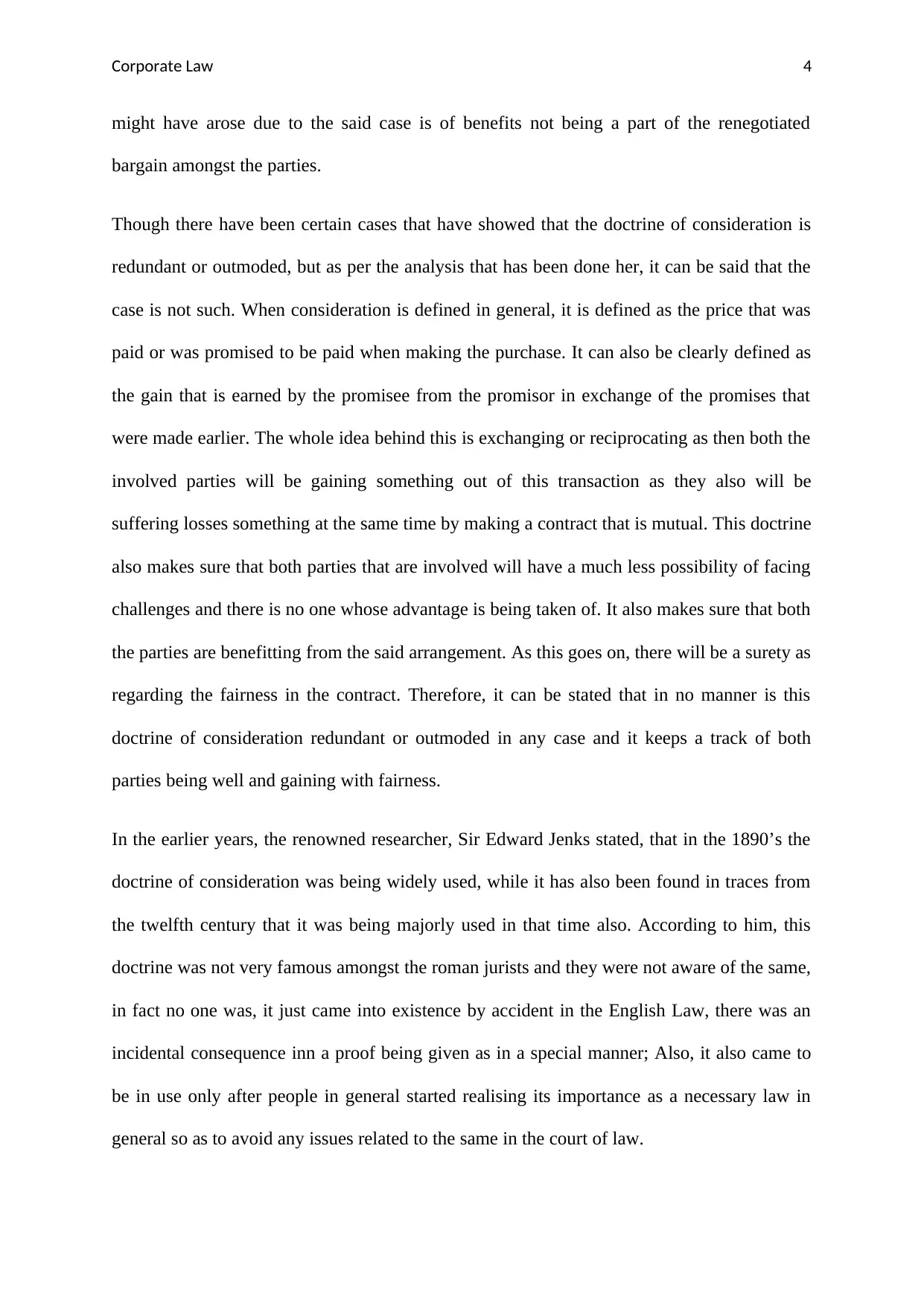
Corporate Law 4
might have arose due to the said case is of benefits not being a part of the renegotiated
bargain amongst the parties.
Though there have been certain cases that have showed that the doctrine of consideration is
redundant or outmoded, but as per the analysis that has been done her, it can be said that the
case is not such. When consideration is defined in general, it is defined as the price that was
paid or was promised to be paid when making the purchase. It can also be clearly defined as
the gain that is earned by the promisee from the promisor in exchange of the promises that
were made earlier. The whole idea behind this is exchanging or reciprocating as then both the
involved parties will be gaining something out of this transaction as they also will be
suffering losses something at the same time by making a contract that is mutual. This doctrine
also makes sure that both parties that are involved will have a much less possibility of facing
challenges and there is no one whose advantage is being taken of. It also makes sure that both
the parties are benefitting from the said arrangement. As this goes on, there will be a surety as
regarding the fairness in the contract. Therefore, it can be stated that in no manner is this
doctrine of consideration redundant or outmoded in any case and it keeps a track of both
parties being well and gaining with fairness.
In the earlier years, the renowned researcher, Sir Edward Jenks stated, that in the 1890’s the
doctrine of consideration was being widely used, while it has also been found in traces from
the twelfth century that it was being majorly used in that time also. According to him, this
doctrine was not very famous amongst the roman jurists and they were not aware of the same,
in fact no one was, it just came into existence by accident in the English Law, there was an
incidental consequence inn a proof being given as in a special manner; Also, it also came to
be in use only after people in general started realising its importance as a necessary law in
general so as to avoid any issues related to the same in the court of law.
might have arose due to the said case is of benefits not being a part of the renegotiated
bargain amongst the parties.
Though there have been certain cases that have showed that the doctrine of consideration is
redundant or outmoded, but as per the analysis that has been done her, it can be said that the
case is not such. When consideration is defined in general, it is defined as the price that was
paid or was promised to be paid when making the purchase. It can also be clearly defined as
the gain that is earned by the promisee from the promisor in exchange of the promises that
were made earlier. The whole idea behind this is exchanging or reciprocating as then both the
involved parties will be gaining something out of this transaction as they also will be
suffering losses something at the same time by making a contract that is mutual. This doctrine
also makes sure that both parties that are involved will have a much less possibility of facing
challenges and there is no one whose advantage is being taken of. It also makes sure that both
the parties are benefitting from the said arrangement. As this goes on, there will be a surety as
regarding the fairness in the contract. Therefore, it can be stated that in no manner is this
doctrine of consideration redundant or outmoded in any case and it keeps a track of both
parties being well and gaining with fairness.
In the earlier years, the renowned researcher, Sir Edward Jenks stated, that in the 1890’s the
doctrine of consideration was being widely used, while it has also been found in traces from
the twelfth century that it was being majorly used in that time also. According to him, this
doctrine was not very famous amongst the roman jurists and they were not aware of the same,
in fact no one was, it just came into existence by accident in the English Law, there was an
incidental consequence inn a proof being given as in a special manner; Also, it also came to
be in use only after people in general started realising its importance as a necessary law in
general so as to avoid any issues related to the same in the court of law.
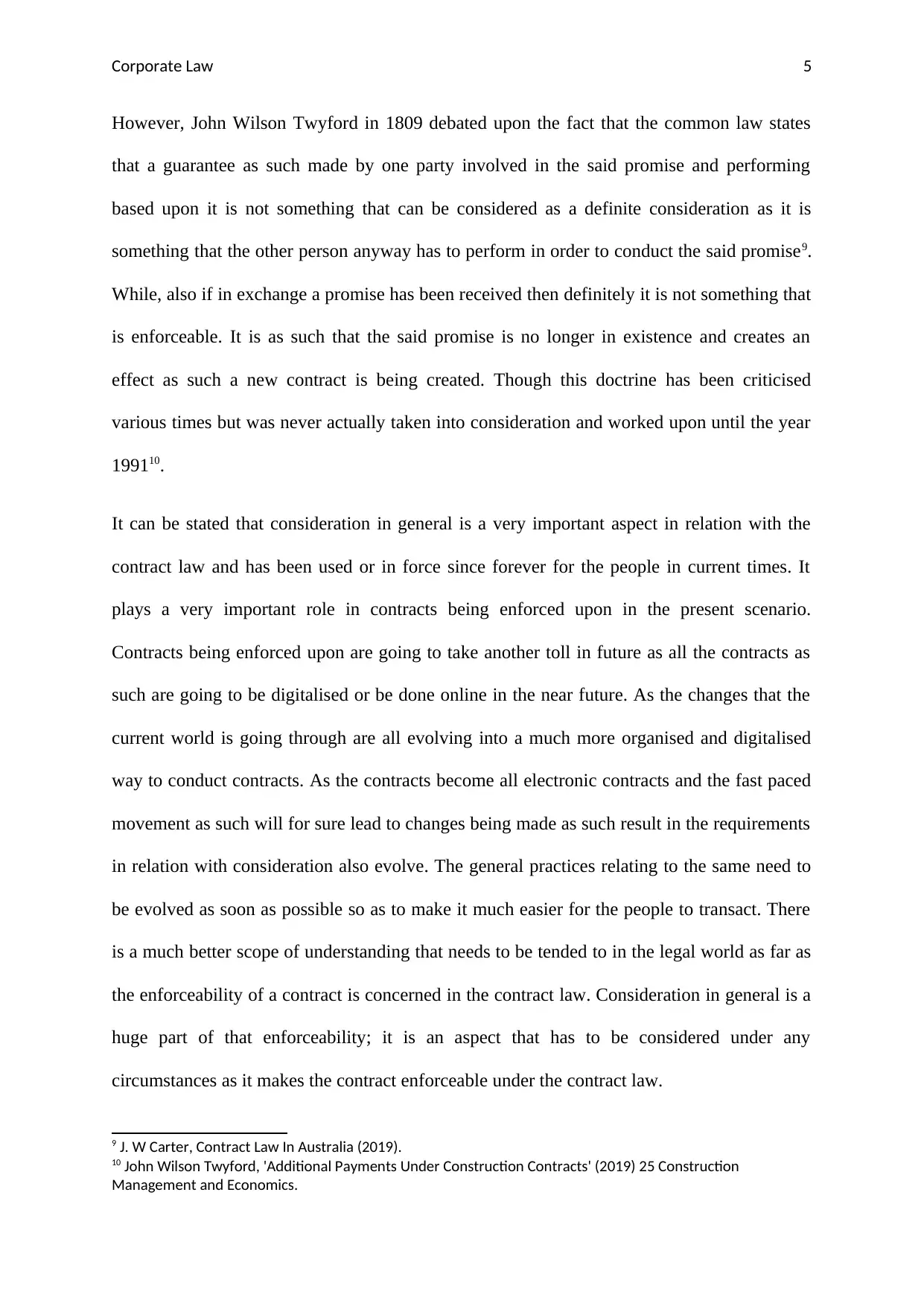
Corporate Law 5
However, John Wilson Twyford in 1809 debated upon the fact that the common law states
that a guarantee as such made by one party involved in the said promise and performing
based upon it is not something that can be considered as a definite consideration as it is
something that the other person anyway has to perform in order to conduct the said promise9.
While, also if in exchange a promise has been received then definitely it is not something that
is enforceable. It is as such that the said promise is no longer in existence and creates an
effect as such a new contract is being created. Though this doctrine has been criticised
various times but was never actually taken into consideration and worked upon until the year
199110.
It can be stated that consideration in general is a very important aspect in relation with the
contract law and has been used or in force since forever for the people in current times. It
plays a very important role in contracts being enforced upon in the present scenario.
Contracts being enforced upon are going to take another toll in future as all the contracts as
such are going to be digitalised or be done online in the near future. As the changes that the
current world is going through are all evolving into a much more organised and digitalised
way to conduct contracts. As the contracts become all electronic contracts and the fast paced
movement as such will for sure lead to changes being made as such result in the requirements
in relation with consideration also evolve. The general practices relating to the same need to
be evolved as soon as possible so as to make it much easier for the people to transact. There
is a much better scope of understanding that needs to be tended to in the legal world as far as
the enforceability of a contract is concerned in the contract law. Consideration in general is a
huge part of that enforceability; it is an aspect that has to be considered under any
circumstances as it makes the contract enforceable under the contract law.
9 J. W Carter, Contract Law In Australia (2019).
10 John Wilson Twyford, 'Additional Payments Under Construction Contracts' (2019) 25 Construction
Management and Economics.
However, John Wilson Twyford in 1809 debated upon the fact that the common law states
that a guarantee as such made by one party involved in the said promise and performing
based upon it is not something that can be considered as a definite consideration as it is
something that the other person anyway has to perform in order to conduct the said promise9.
While, also if in exchange a promise has been received then definitely it is not something that
is enforceable. It is as such that the said promise is no longer in existence and creates an
effect as such a new contract is being created. Though this doctrine has been criticised
various times but was never actually taken into consideration and worked upon until the year
199110.
It can be stated that consideration in general is a very important aspect in relation with the
contract law and has been used or in force since forever for the people in current times. It
plays a very important role in contracts being enforced upon in the present scenario.
Contracts being enforced upon are going to take another toll in future as all the contracts as
such are going to be digitalised or be done online in the near future. As the changes that the
current world is going through are all evolving into a much more organised and digitalised
way to conduct contracts. As the contracts become all electronic contracts and the fast paced
movement as such will for sure lead to changes being made as such result in the requirements
in relation with consideration also evolve. The general practices relating to the same need to
be evolved as soon as possible so as to make it much easier for the people to transact. There
is a much better scope of understanding that needs to be tended to in the legal world as far as
the enforceability of a contract is concerned in the contract law. Consideration in general is a
huge part of that enforceability; it is an aspect that has to be considered under any
circumstances as it makes the contract enforceable under the contract law.
9 J. W Carter, Contract Law In Australia (2019).
10 John Wilson Twyford, 'Additional Payments Under Construction Contracts' (2019) 25 Construction
Management and Economics.
⊘ This is a preview!⊘
Do you want full access?
Subscribe today to unlock all pages.

Trusted by 1+ million students worldwide
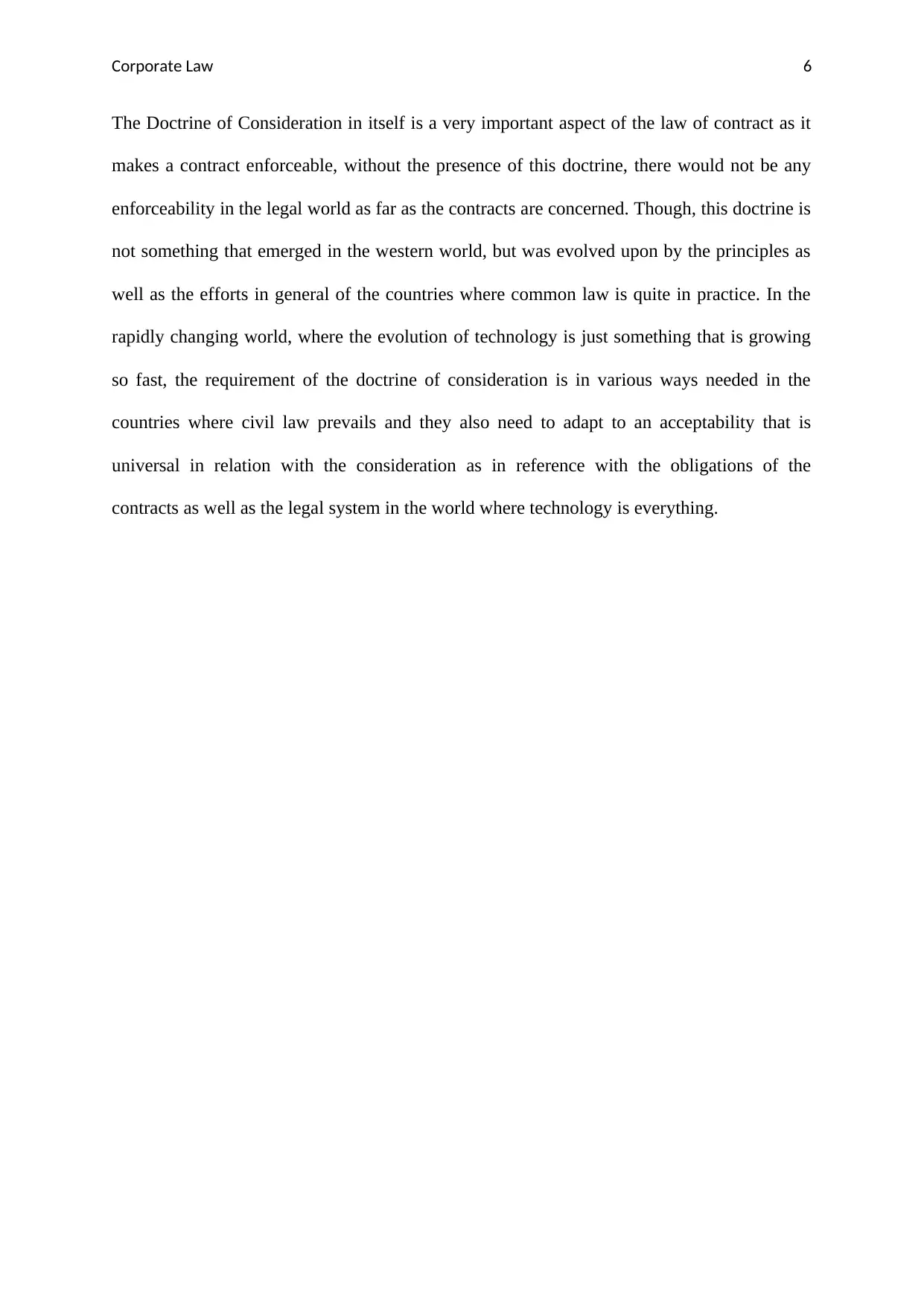
Corporate Law 6
The Doctrine of Consideration in itself is a very important aspect of the law of contract as it
makes a contract enforceable, without the presence of this doctrine, there would not be any
enforceability in the legal world as far as the contracts are concerned. Though, this doctrine is
not something that emerged in the western world, but was evolved upon by the principles as
well as the efforts in general of the countries where common law is quite in practice. In the
rapidly changing world, where the evolution of technology is just something that is growing
so fast, the requirement of the doctrine of consideration is in various ways needed in the
countries where civil law prevails and they also need to adapt to an acceptability that is
universal in relation with the consideration as in reference with the obligations of the
contracts as well as the legal system in the world where technology is everything.
The Doctrine of Consideration in itself is a very important aspect of the law of contract as it
makes a contract enforceable, without the presence of this doctrine, there would not be any
enforceability in the legal world as far as the contracts are concerned. Though, this doctrine is
not something that emerged in the western world, but was evolved upon by the principles as
well as the efforts in general of the countries where common law is quite in practice. In the
rapidly changing world, where the evolution of technology is just something that is growing
so fast, the requirement of the doctrine of consideration is in various ways needed in the
countries where civil law prevails and they also need to adapt to an acceptability that is
universal in relation with the consideration as in reference with the obligations of the
contracts as well as the legal system in the world where technology is everything.
Paraphrase This Document
Need a fresh take? Get an instant paraphrase of this document with our AI Paraphraser
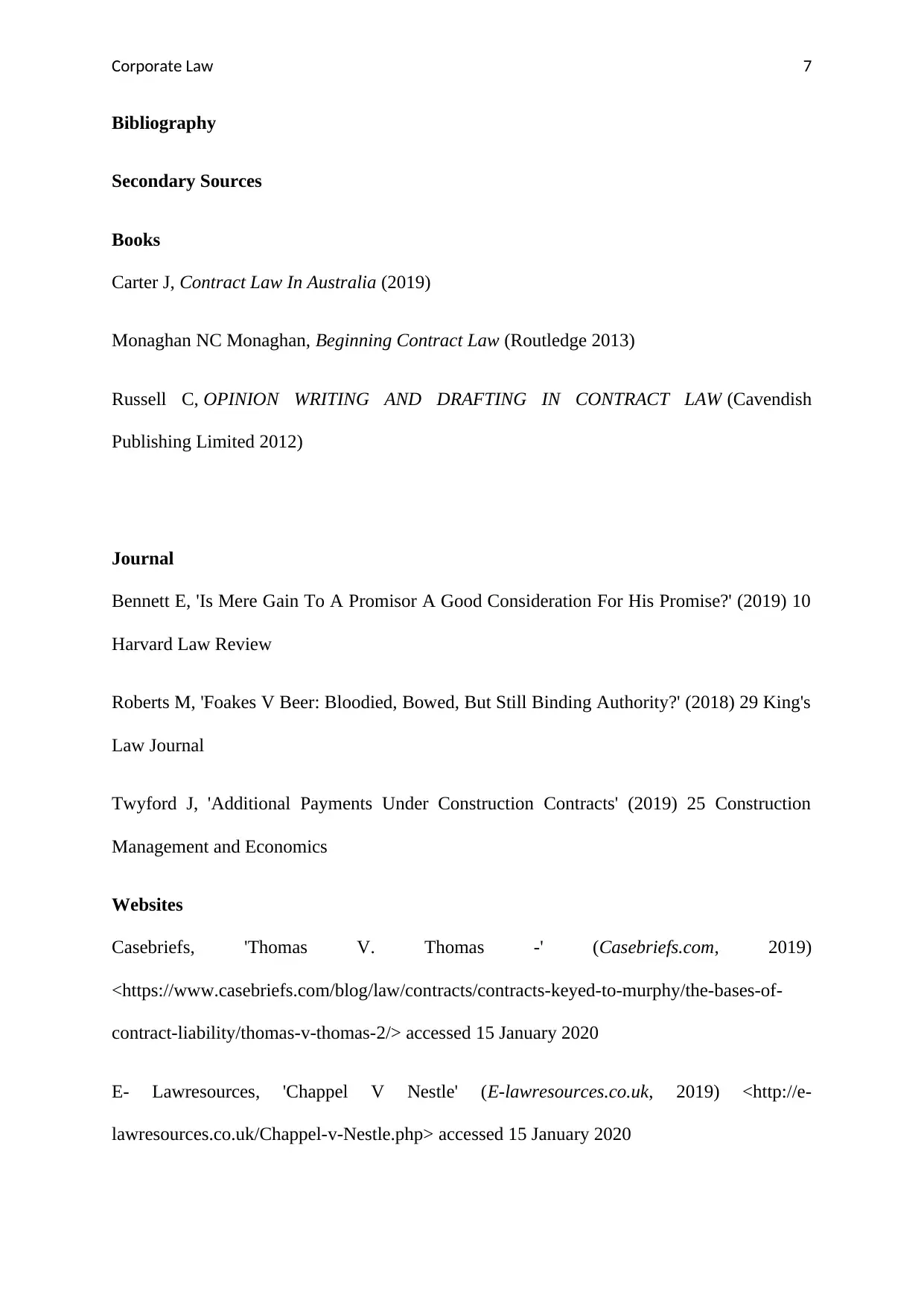
Corporate Law 7
Bibliography
Secondary Sources
Books
Carter J, Contract Law In Australia (2019)
Monaghan NC Monaghan, Beginning Contract Law (Routledge 2013)
Russell C, OPINION WRITING AND DRAFTING IN CONTRACT LAW (Cavendish
Publishing Limited 2012)
Journal
Bennett E, 'Is Mere Gain To A Promisor A Good Consideration For His Promise?' (2019) 10
Harvard Law Review
Roberts M, 'Foakes V Beer: Bloodied, Bowed, But Still Binding Authority?' (2018) 29 King's
Law Journal
Twyford J, 'Additional Payments Under Construction Contracts' (2019) 25 Construction
Management and Economics
Websites
Casebriefs, 'Thomas V. Thomas -' (Casebriefs.com, 2019)
<https://www.casebriefs.com/blog/law/contracts/contracts-keyed-to-murphy/the-bases-of-
contract-liability/thomas-v-thomas-2/> accessed 15 January 2020
E- Lawresources, 'Chappel V Nestle' (E-lawresources.co.uk, 2019) <http://e-
lawresources.co.uk/Chappel-v-Nestle.php> accessed 15 January 2020
Bibliography
Secondary Sources
Books
Carter J, Contract Law In Australia (2019)
Monaghan NC Monaghan, Beginning Contract Law (Routledge 2013)
Russell C, OPINION WRITING AND DRAFTING IN CONTRACT LAW (Cavendish
Publishing Limited 2012)
Journal
Bennett E, 'Is Mere Gain To A Promisor A Good Consideration For His Promise?' (2019) 10
Harvard Law Review
Roberts M, 'Foakes V Beer: Bloodied, Bowed, But Still Binding Authority?' (2018) 29 King's
Law Journal
Twyford J, 'Additional Payments Under Construction Contracts' (2019) 25 Construction
Management and Economics
Websites
Casebriefs, 'Thomas V. Thomas -' (Casebriefs.com, 2019)
<https://www.casebriefs.com/blog/law/contracts/contracts-keyed-to-murphy/the-bases-of-
contract-liability/thomas-v-thomas-2/> accessed 15 January 2020
E- Lawresources, 'Chappel V Nestle' (E-lawresources.co.uk, 2019) <http://e-
lawresources.co.uk/Chappel-v-Nestle.php> accessed 15 January 2020
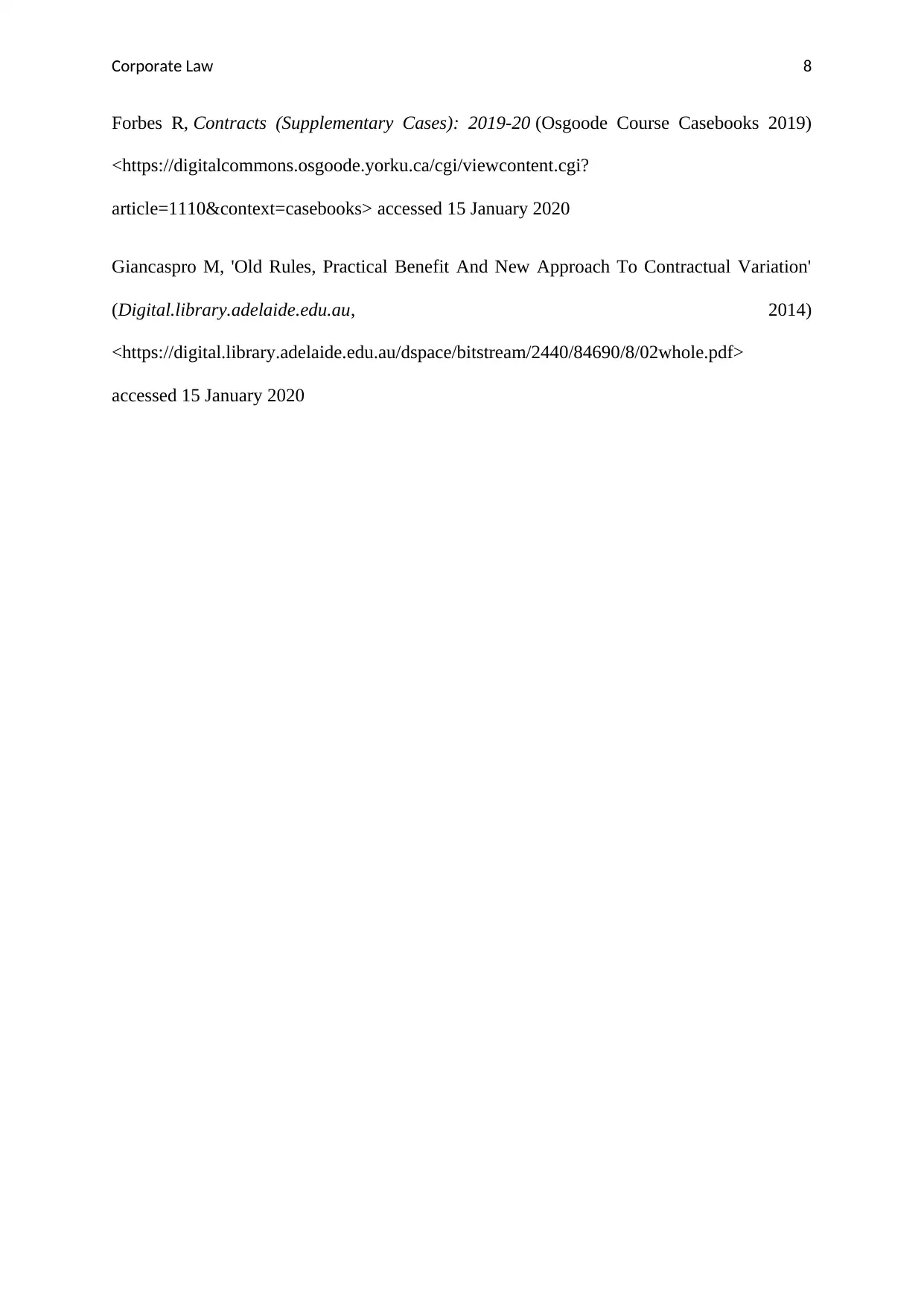
Corporate Law 8
Forbes R, Contracts (Supplementary Cases): 2019-20 (Osgoode Course Casebooks 2019)
<https://digitalcommons.osgoode.yorku.ca/cgi/viewcontent.cgi?
article=1110&context=casebooks> accessed 15 January 2020
Giancaspro M, 'Old Rules, Practical Benefit And New Approach To Contractual Variation'
(Digital.library.adelaide.edu.au, 2014)
<https://digital.library.adelaide.edu.au/dspace/bitstream/2440/84690/8/02whole.pdf>
accessed 15 January 2020
Forbes R, Contracts (Supplementary Cases): 2019-20 (Osgoode Course Casebooks 2019)
<https://digitalcommons.osgoode.yorku.ca/cgi/viewcontent.cgi?
article=1110&context=casebooks> accessed 15 January 2020
Giancaspro M, 'Old Rules, Practical Benefit And New Approach To Contractual Variation'
(Digital.library.adelaide.edu.au, 2014)
<https://digital.library.adelaide.edu.au/dspace/bitstream/2440/84690/8/02whole.pdf>
accessed 15 January 2020
⊘ This is a preview!⊘
Do you want full access?
Subscribe today to unlock all pages.

Trusted by 1+ million students worldwide
1 out of 9
Your All-in-One AI-Powered Toolkit for Academic Success.
+13062052269
info@desklib.com
Available 24*7 on WhatsApp / Email
![[object Object]](/_next/static/media/star-bottom.7253800d.svg)
Unlock your academic potential
Copyright © 2020–2026 A2Z Services. All Rights Reserved. Developed and managed by ZUCOL.


